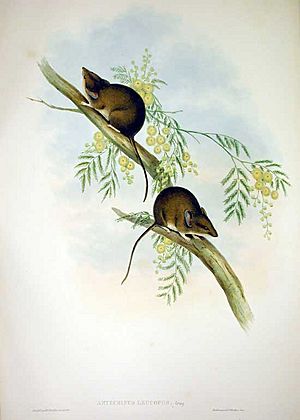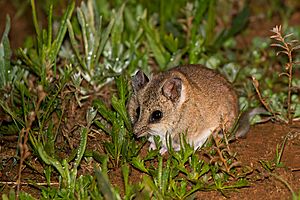Dunnart facts for kids
Quick facts for kids Dunnart |
|
|---|---|
 |
|
| A white-footed dunnart | |
| Scientific classification |
|
| Kingdom: | Animalia |
| Phylum: | Chordata |
| Class: | Mammalia |
| Infraclass: | Marsupialia |
| Order: | Dasyuromorphia |
| Family: | Dasyuridae |
| Subfamily: | Sminthopsinae |
| Tribe: | Sminthopsini |
| Genus: | Sminthopsis Thomas, 1887 |
| Type species | |
| Phascogale crassicaudata Gould, 1844
|
|
| Species | |
|
21, see text |
|
A dunnart is a small, mouse-sized marsupial found in Australia and New Guinea. These tiny animals belong to a group called Sminthopsis. Dunnarts mainly eat insects, making them insectivores.
Contents
What is a Dunnart?
Dunnarts are special because they are marsupials. This means the mothers carry their babies in a pouch, just like kangaroos! They are about the size of a small mouse.
Where do Dunnarts Live?
You can find dunnarts living in different parts of Australia and New Guinea. They are very good at adapting to many environments. This includes dry deserts and even some forests.
What do Dunnarts Eat?
Dunnarts are mostly insectivores. This means their favorite foods are insects! They also eat other small creatures. Their diet helps them get all the energy they need to survive.
Discovering Dunnarts
The name Sminthopsis was first used in 1887 by a scientist named Oldfield Thomas. Before that, another name was used, but it was already taken by a type of beetle. So, a new name was needed for these unique marsupials.
How Many Types of Dunnarts Are There?
There are about 21 different kinds of dunnarts! Each one is a unique species. They all live in Australia and New Guinea. Some well-known types include the Fat-tailed dunnart and the White-footed dunnart.
Amazing Dunnart Facts
Dunnarts are known for their small size. They are very quick and agile. This helps them hunt insects and avoid predators. They are mostly active at night.
Unique Features of Dunnarts
One interesting fact about male dunnarts is about their Y chromosome. It is the smallest Y chromosome known in any mammal! This is a tiny part of their DNA.
See also
 In Spanish: Ratones marsupiales para niños
In Spanish: Ratones marsupiales para niños
Images for kids
 | Jessica Watkins |
 | Robert Henry Lawrence Jr. |
 | Mae Jemison |
 | Sian Proctor |
 | Guion Bluford |




